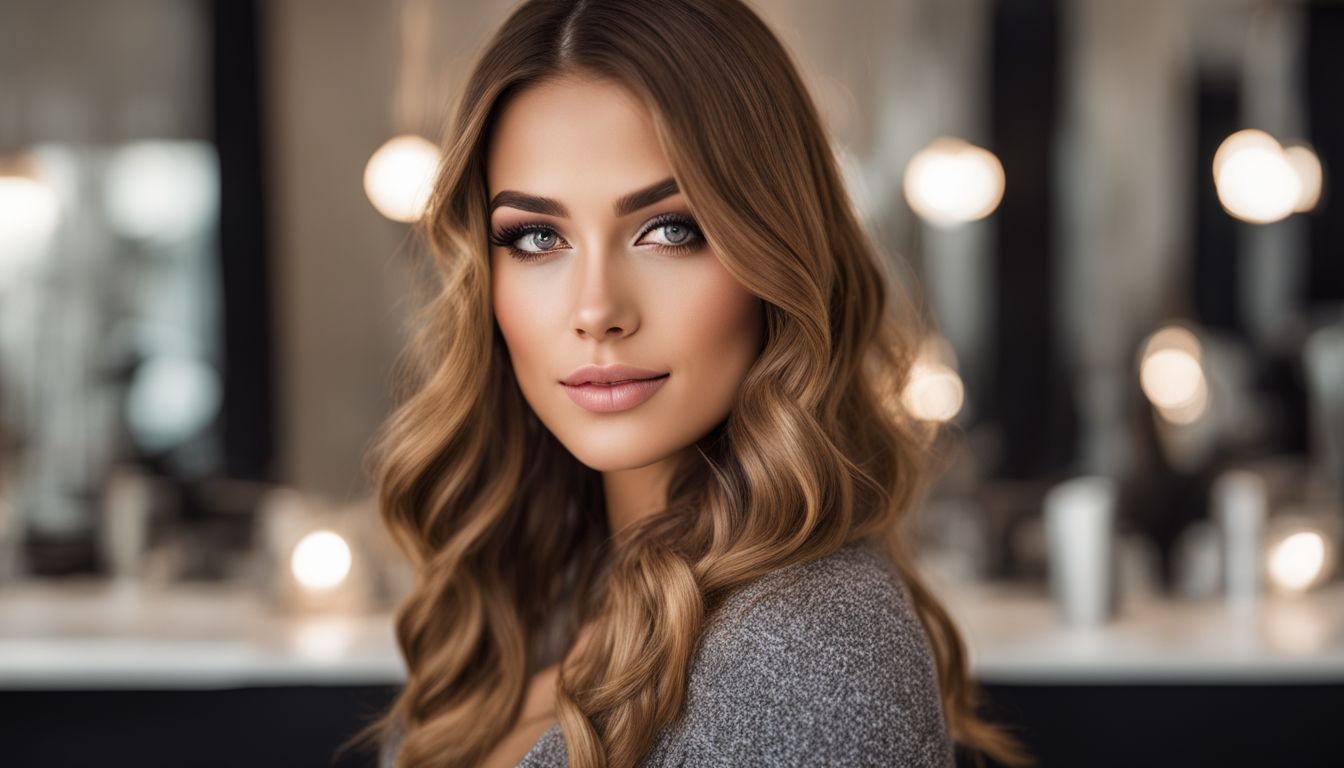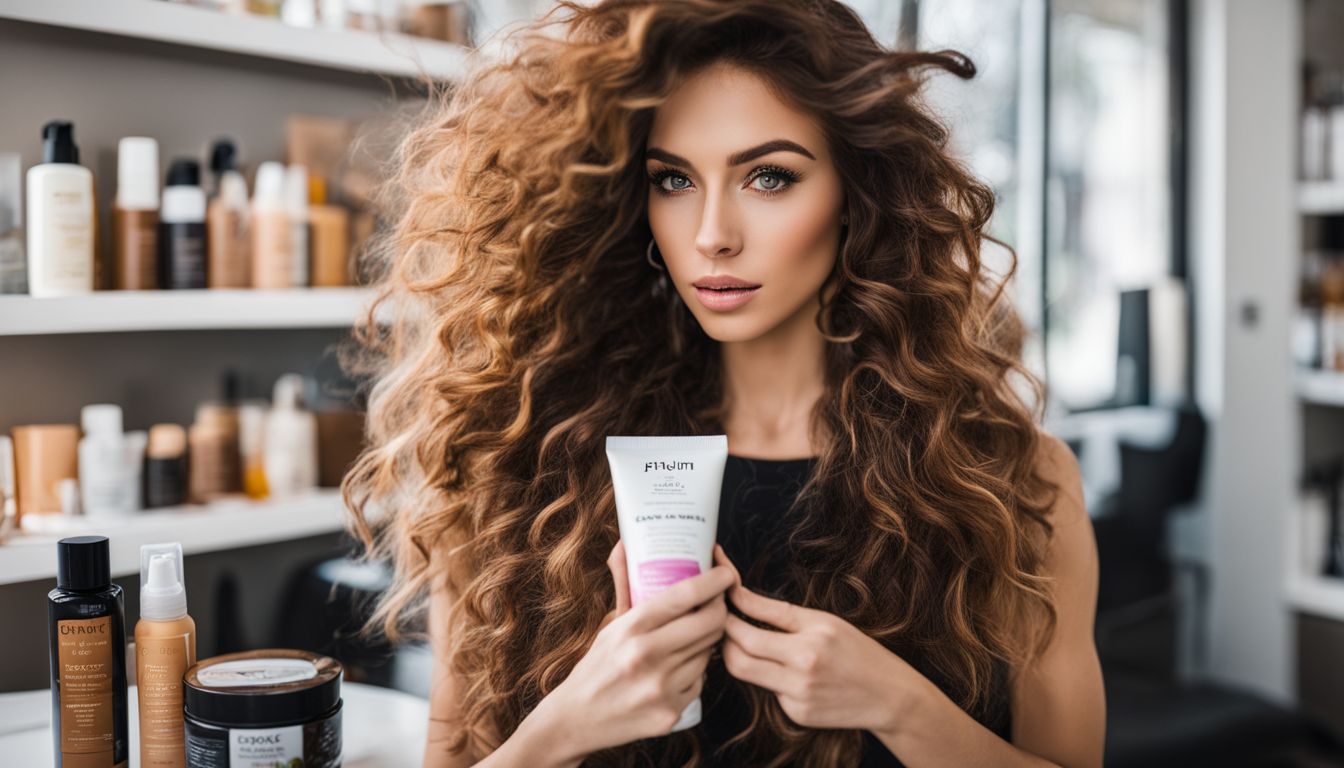What Is Keratin And How Does It Affect Hair?

Struggling with hair that’s lost its luster or strength? Keratin might just be the missing ingredient in your hair care routine. In this blog post, we’ll unravel the secrets of keratin – a superhero protein that could transform how your hair looks and feels.
Get ready for insights on improving your locks from dull to dynamic – let’s dive into the world of keratin together!
Key Takeaways
- Keratin is a protein that makes up about 80% of hair, providing it with strength, flexibility, and shine.
- Damaging hair treatments like bleaching and ironing can break down keratin, leading to weakened strands and loss of natural sheen.
- Using keratin – based hair care products such as shampoos, conditioners, serums, and supplements can help restore damaged hair by replenishing its natural proteins.
- Eating foods rich in the nutrients needed for keratin production, including eggs, salmon, sweet potatoes, sunflower seeds kale and mangos supports healthy hair growth from within.
- Salon keratin treatments may contain formaldehyde—a potential health hazard—highlighting the importance of professional guidance for safe application.
What is Keratin and its Role in Hair Health

Keratin is the main structural component of hair, providing strength, flexibility, and shine. It plays a crucial role in maintaining the overall health and appearance of your hair.
Keratin as the main structural component of hair
Hair is not just a beauty feature; it’s a complex structure built primarily from keratin, making up about 80% of each strand. This protein is what gives hair its strength and flexibility, allowing it to withstand everyday wear and tear.
Think of keratin as the scaffolding that maintains the hair’s shape and protects each thread from damage.
This powerhouse protein consists of long chains of amino acids that form strong fibrous strands. These strands are resilient enough to manage the stress caused by brushing, styling, and exposure to environmental elements.
A healthy supply of keratin in your hair means less chance for breakage, fewer split ends, and more durability — leading to a fuller head of hair with natural shine and smoothness.
Importance of keratin in providing strength, flexibility, and shine to hair
Keratin plays a central role in the health and vitality of your hair, acting like a protective protein armor. This tough protein is what gives your strands their structure, preventing them from getting tangled and knotted.
It’s not just about avoiding snarls; keratin’s unique qualities also contribute to hair’s strength and resilience, enabling it to weather everyday wear and tear.
Glossy locks that catch the light aren’t solely due to the latest styling products—keratin naturally adds luster and shine. Over time, though, daily activities such as brushing or exposure to heat styling tools can diminish keratins’ presence in your tresses.
To counter this depletion, incorporating keratin-rich foods into your diet or using specifically formulated haircare products can help restore that all-important sheen and elasticity so you can enjoy beautiful, healthy-looking hair every day.
Effects of Damaging Procedures on Keratin

Damaging procedures such as bleaching and ironing can break down the keratin in hair, leading to weakened strands, increased frizz, and dullness. These treatments can also strip away essential oils, causing dryness and brittleness in the hair.
Impact of bleaching, ironing, and other damaging treatments on keratin
Bleaching and ironing pull no punches on hair’s keratin, the protein that keeps hair looking strong and shiny. These harsh treatments can strip away the natural oils that protect keratin, leading to brittle strands.
When you bleach your hair, you alter its structure by breaking down keratin’s bonds. This not only weakens hair but also makes it prone to breakage and split ends.
Ironing your hair at high temperatures does more harm than good; it can scorch the keratin, causing it to denature. This process robs your locks of their natural bounce and resilience, leaving them limp and lifeless.
Frequent use of hot tools like curling irons or straighteners intensifies this effect, damaging the proteins beyond repair over time, which may result in a lackluster appearance and increased potential for shedding prematurely.
Resulting effects on hair quality and appearance
Excessive bleaching, ironing, and other damaging procedures can lead to dry, fragile, and lackluster hair. These processes cause the keratin protein in the hair to denature, resulting in a significant deterioration of hair quality and appearance.
Hair becomes rough and prone to breakage as these procedures strip away the natural strength and flexibility provided by keratin.
The impact is evident in brittle strands that often appear dull and lifeless due to the loss of essential proteins caused by damaging treatments. This damage affects not only the structure but also the overall texture of the hair, resulting in a noticeable decline in its health and visual appeal.
Keratin-based Hair Products and Treatments
Keratin-based hair products and treatments are designed to restore and enhance the natural strength and shine of your hair. From shampoos and conditioners to serums and supplements, there are various options available to help improve the overall health of your hair.
Various keratin products and their role in restoring and enhancing hair
Keratin products play a vital role in restoring and enhancing hair health by providing essential nutrients and strengthening properties. They include:
- Keratin shampoos: These are formulated to cleanse the hair while replenishing lost keratin, promoting healthier and stronger strands.
- Keratin conditioners: Designed to nourish and moisturize the hair, these products help restore elasticity and shine to damaged hair.
- Keratin serums: These lightweight treatments penetrate deeply into the hair shaft, repairing damage and sealing split ends for smoother, more manageable hair.
- Keratin supplements: Available in powder or capsule form, these supplements can enhance keratin absorption from the gut, contributing to overall hair health from within.
- Hair masks with hydrolyzed keratin: This treatment helps repair and fortify damaged hair by infusing it with essential proteins that strengthen the strands from root to tip.
- Over-the-counter keratin treatments: Milder than salon treatments, these products provide some benefits with fewer risks when used at home under professional guidance.
Overview of keratin treatments and their benefits and potential risks
After exploring various keratin products and their role in restoring and enhancing hair, it’s essential to understand the overview of keratin treatments and their associated benefits and potential risks.
Keratin treatments aim to restore strength, structure, and shine to damaged hair by infusing protein into porous strands, reducing frizz while providing temporary smoothness. These treatments offer benefits such as improving hair manageability, increasing shine, and reducing styling time.
However, it’s crucial to note that some keratin products may contain formaldehyde, a potential carcinogen that poses health risks for both consumers and hairstylists. Additionally, high heat used during these treatments can potentially damage hair by breaking down its natural keratin structure.
Alternatives to Salon Treatments
Consider incorporating keratin-based serums, shampoos, conditioners, and supplements into your hair care routine. You can also improve hair health by adding keratin-rich foods to your diet.
Use of keratin-based serums, shampoos, conditioners, and supplements
Keratin-based products, such as serums, shampoos, conditioners, and supplements, play a vital role in reviving and maintaining hair health. These products are formulated with hydrolyzed keratin and other beneficial ingredients to cater to specific hair needs.
- Keratin serums work by infusing strands with proteins to repair damage and restore strength, resulting in smoother and more manageable hair.
- Keratin shampoos gently cleanse the hair while depositing keratin to help fortify the strands and enhance overall resilience.
- Conditioners containing keratin aim to replenish moisture, improve elasticity, and protect against further damage, leaving the hair silky and lustrous.
- Over-the-counter keratin supplements are available in various forms such as powder or capsule for those seeking an internal boost for their hair health.
- The absorption of keratin supplements is still debated; however, incorporating foods rich in keratin into the diet can naturally support the body’s production of this essential protein.
- When used consistently, these products offer a convenient solution to maintain healthy – looking hair without relying solely on salon treatments.
Incorporating keratin-rich foods into the diet for improved hair health
Keratin-rich foods such as eggs, salmon, and sweet potatoes can help improve hair health. Consuming these nutrient-dense options provides essential building blocks for the body to produce keratin, contributing to stronger and healthier hair.
Additionally, including sunflower seeds, kale, and mangos in the diet can further enhance keratin absorption, promoting shinier and thicker-looking hair.
Biotin, Zinc, and Keratin are also vital nutrients that support healthy hair growth. Incorporating these into one’s diet or through gentle densifying shampoos can result in smoother and healthier-looking hair with improved texture.
Risks and Side Effects of Keratin Treatments
While keratin treatments can effectively restore and strengthen hair, there are potential risks and side effects to consider. These include exposure to formaldehyde in some salon treatments and the importance of seeking professional guidance for safe application.
Potential exposure to formaldehyde and other risks associated with salon treatments
Salon treatments involving keratin can pose potential risks, especially due to the use of formaldehyde in certain products. Formaldehyde is a known carcinogen and exposure to it during salon-grade treatments may present health hazards for both clients and hairstylists.
Additionally, high heat used during these treatments can break down the hair’s natural keratin structure, leading to damage and weakening of the strands. It’s crucial for individuals considering such treatments to be aware of these risks and seek professional guidance for safe application.
Hairstylists who work with keratin treatment products are particularly at risk of exposure to formaldehyde. The artificial keratin preparations found in some products may contain this potentially harmful substance, emphasizing the importance of understanding product ingredients before use.
Importance of seeking professional guidance for safe application of treatments
Seeking professional guidance is crucial for the safe and effective application of keratin treatments, especially considering the potential risks involved. Professional stylists are trained to handle these treatments with care, ensuring that your hair and overall health are not compromised.
They can also provide personalized recommendations based on your specific hair type and condition, minimizing the risk of adverse effects such as damage or exposure to harmful chemicals like formaldehyde.
Professional guidance also ensures that salon-grade products containing formaldehyde are used in a controlled environment, reducing the risk of inhalation or skin contact. Moreover, seeking expert advice will help you understand all potential risks associated with these treatments, allowing you to make an informed decision about whether a keratin treatment is suitable for you.
Conclusion
Incorporating keratin-rich foods and using appropriate products can contribute to improved hair health. Understanding the specific needs of your hair and seeking professional guidance before applying treatments is crucial.
Make informed choices to nourish and protect your hair with the right balance of care and caution.
FAQs
1. What exactly is keratin and where is it found in the body?
Keratin is a tough protein found mainly in your hair, nails, and skin. It helps strengthen these parts of your body and plays a role in keeping them healthy.
2. Can keratin treatments make my hair healthier?
Yes! Keratin treatments can improve hair strength, making it less prone to damage. They work by adding keratin back into the hair, smoothing down the scales on hair shafts for straighter and sleeker appearance.
3. Do all keratin products have chemicals that might harm my health?
While not all keratin products are harmful, some ingredients like formalin used in Brazilian blowouts can release dangerous chemicals when heated. Always check with a trusted professional about safe options for your hair type.
4. If I dye my hair, how does keratin affect its color?
Hair dyes change the colors of your locks by affecting melanin – eumelanin for darker shades and pheomelanin for lighter ones – without significantly impacting the natural structure of kertain in human’shair fibers.
5. Is there any way to naturally boost my body’s production of keratin?
Indeed there is! Consuming a balanced diet rich in vitamins and protein supports the cells that produce keratins—leading to stronger nails and skin condition improvement alongside healthier tresses.
6.How does heat from styling tools impact my hair’s natural keratins?
Styling tools like hairdryers apply heat which can weaken hydrogen bonds within polypeptide chains within alpha-keratins present throughout each strand leading to potential breakage or frizzy texture over time.
Take our hair quiz today to learn what nutrients your hair needs.
References
Maneli MH, Smith P, Khumalo NP. Elevated formaldehyde concentration in “Brazilian keratin type” hair-straightening products: A cross-sectional study. Journal of the American Academy of Dermatology. 2014 Feb 1;70(2):276-80.
Tinoco A, Gonçalves J, Silva C, Loureiro A, Gomes AC, Cavaco‐Paulo A, Ribeiro A. Keratin‐based particles for protection and restoration of hair properties. International journal of cosmetic science. 2018 Aug;40(4):408-19.
Swenberg JA, Moeller BC, Lu K, Rager JE, Fry RC, Starr TB. Formaldehyde carcinogenicity research: 30 years and counting for mode of action, epidemiology, and cancer risk assessment. Toxicologic pathology. 2013 Feb;41(2):181-9.
Langbein L, Schweizer J. Keratins of the human hair follicle. International review of cytology. 2005 Jan 1;243:1-78.
